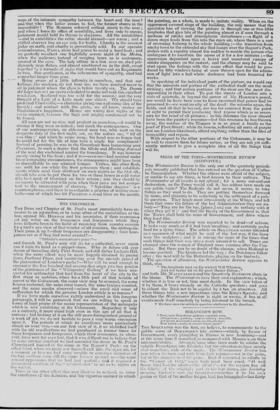THE COLOSSEUM.
THE Dean and Chapter of St. Paul's must immediately have recourse to an injunction, or to some other of the amiabilities of the law, against Mr. HORNOR and his associates, if their reverences set any value on the twopences and fourpences which they have hitherto been in the habit of receiving from country cousins for a bird's eye view of that wonder of all wonders, the metropolis. Their game is up !—their twopences are disappearing ; their fourpences are as if they had never existed !— " Othello's occupation's gone and though St. Paul's may still do for a cathedral, never again can it raise its head as a puppet-show. Who in future will ever dream of threading dirty Fleet Street, and still dirtier Ludgate Hill, when the same effect may be more happily obtained by pacing down Portland Place, and sauntering over the smooth gravel of the pleasantest of London's parks ?—:Who will be mad enough to encounter the five hundred and seventy-five steps (we beg pardon of the gentleman of the " Whispering Gallery" if we have misquoted his arithmetic) that lead from the heart of the city to the first stage in nubibus, when for a fifth part of that trouble of ascent at the Colosseum, the same view may be scanned, the same houses reckoned, the same river traced, the same bridges counted, and the same smoke observed—minus the smell and sense of suffocation for which the genuine London article is so famous? If we have made ourselves rightly understood in this foregone paragraph, it will be perceived that we are willing to speak in terms of high praise of the scenic representation of the metropolis which is now exhibiting at the Colosseum. Regarding it only as a curiosity, it must sand high even in this age of all that is curious ; but looking at it on the still more distinguished ground of a work of art, we do not hesitate to pass a very warm encomium upon it. The periods at which its excellence more particularly struck us were two,—on our first view of it, it so identified itself with the old recollections we had purchased in former times for those twopences and fern-peaces, which their reverences, as aforesaid, have now for ever lost, that it was difficult not to believe that by some strange accident we had ascended the dome in St. Paul's Churchyard instead of the dome in the Regent's Park : on the other hand, when we made our farewell exit into the open air, for a moment or two we had some trouble to convince ourselves of the fact ;—there vere still the same houses around us—the same general appearance that we had just quitted ; an it required a momentary exertion of the " ratio:v-11 roan" to set us tO rights on the matter.
There is one other eifeet that may likewise be noticed, to show the excellence ef the delusion, and the vigorous manner in which the painting, as a whole, is made to imitate reality. When on the uppermost covered stage of the building, the only means that the spectator has of viewing the picture is through one or two little loopholes that give bits of the painting almost as if seen through a medium of smoke and atmospheric disturbance ;—a flight of a dozen steps leads from this into the open air, where there is a sort of crowning balcony to the whole building ;—the transition from smoky town to the unloaded sky that hangs over the Regent's Park, strikes with a rapidity almost too sudden to enable the person who undergoes it to ascertain the cause of it for a few minutes ;—the oppression dependent upon a heavy and unnatural canopy of smoke disappears on the instant, and the change may be said to start upon the feelings with the same effect that would be produced by fifty windows being at once thrown open for the admission of light into a hall where darkness had been tenanted for weeks.
In speaking of the individual parts of the picture, we would say that the minarets and portico of the cathedral itself are the most striking ; and that certain portions of the river are the most disappointing in their effect. To put the streets of London into a state of quietude, is beyond the power of Mr. HORNOICS pencil, nor would lie have been wise to have exercised that power had lie possessed it—we want no city of the dead : the suburbs again, the fields, and all that lie beyond, are too far removed from the point of sight to permit their producing that repose which is so necessary for the relief of all pictures : in this dilemma the river should have been the painter's resource—but this resource he has thrown away, the surface of the Thames is in as great a bustle as the pave of Fleet Street; while its bosom, reflecting all sorts of purple and un-London-like clouds, afford anything rather than the idea of tranquillity and repose. With respect to the other portions of the Colosseum, it may he as well to reserve them for future notice, as they are not yet sufficiently matured to give a complete idea of all the things that will be.


















 Previous page
Previous page